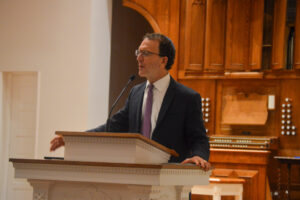
The University of Mississippi’s Hillel Club hosted Rabbi Michan Greenstein at the Paris-Yates Chapel on Thursday, Nov. 7 at 5:30 p.m. for a talk entitled “How Colleges Should Address Antisemitism and Hate.”
Greenstein is the eighth senior rabbi at Temple Israel in Memphis, one of the largest Reform congregations in the U.S. He is also a professor of Jewish Studies at Rhodes College and serves on the Executive Committee of the National Civil Rights Museum. Greenstein previously served on the national board of the NAACP.
Greenstein began the meeting by providing a definition of antisemitism.
“It’s a hatred of Jews, but it’s also a conspiracy theory that cuts across nationalities, ideologies, politics, ethnicities,” Greenstein said. “There was actually a quota in the Ivy League schools of 10% (of students that could be Jewish) until 1964 at Yale. In other words, if there were 700 in a class at Yale, only 70 Jews were admitted, even if there were hundreds more who were qualified.”
Greenstein also shared where he draws the line between criticism of Israel and antisemitism.
“I want to say that criticism of Israeli policy is not antisemitism, just like criticism of American policy is not anti-Americanism, right?” Greenstein said. “You can criticize the policies of the Israeli government and still love Israel, but when you begin to ascribe to Israel antisemitic characteristics like the Jewish state is all powerful, it’s rich, it’s conniving. If all you do is take the word Israel out and put in Jew, then you’re on the slippery slope of prejudice.”
Since the beginning of the current period of conflict between Israel and Hamas began on Oct. 7, 2023, there has been an increase in antisemitism on college campuses, Greenstein said.
“College students across America have experienced difficulty, pain, heartbreak and yes, even personal antisemitism,” Greenstein said. “I’ll give you some examples: finding bright red swastikas and ugly anti-semitic flyers posted on a dorm room walls, being cursed at and threatened while walking across the quad simply for wearing a Star of David necklace, being punched, being spat on, having an Israeli flag torn from a student’s hands and being pelted by rocks thrown at Jewish students during an outdoor Passover Seder.”
Greenstein also shared his thoughts on how colleges should address antisemitism.
“Students and faculty need to be able to explore ideas, including unpopular ones,” Greenstein said. “Unfortunately, the norm for civil discourse has been eroded over the last year at other universities, and it’s pushing us into very dangerous territory.”
His final message addressing antisemitism was that it could only be stopped through education.
Zoe Rubenstein, a junior allied health studies major and president of the Hillel Club, echoed the importance of education.
“I’ve talked to so many people who are friends of mine or people that I have never felt unsafe around, but they just don’t know things. So it’s like they unintentionally say things that you know are anti-semitic or just completely false,” Rubenstein said. “And so I really want that push to have more educated talks and peaceful discussions, just to know more things about Jewish people and anti semitism, even any other minority on campus.”
Rubenstein said the event was made possible through funding from Hillel International.
“We were given a grant by Hillel International to put on an event addressing Oct. 7. I couldn’t do something on October 7, 2024, but I wanted to do something to address it,” Rubenstein said. “I wanted to have something that was peaceful and that was educational for everyone regarding anti-semitism.”



























